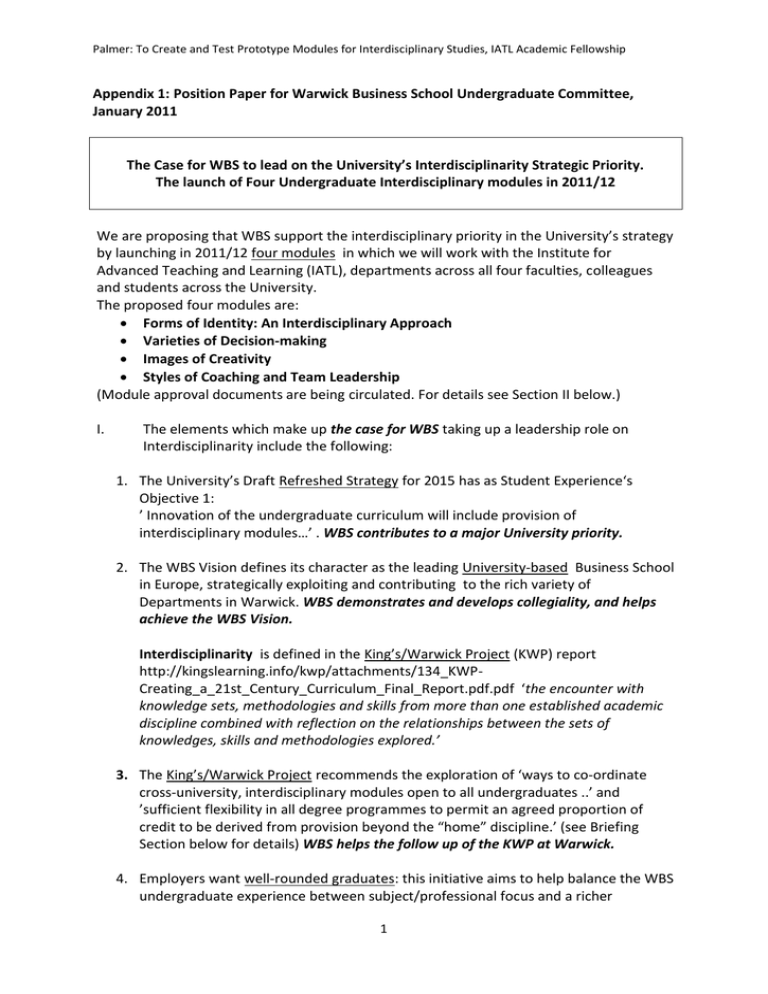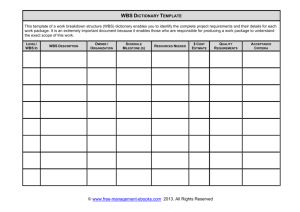Appendix 1: Position Paper for Warwick Business School Undergraduate Committee,
advertisement

Palmer: To Create and Test Prototype Modules for Interdisciplinary Studies, IATL Academic Fellowship Appendix 1: Position Paper for Warwick Business School Undergraduate Committee, January 2011 The Case for WBS to lead on the University’s Interdisciplinarity Strategic Priority. The launch of Four Undergraduate Interdisciplinary modules in 2011/12 We are proposing that WBS support the interdisciplinary priority in the University’s strategy by launching in 2011/12 four modules in which we will work with the Institute for Advanced Teaching and Learning (IATL), departments across all four faculties, colleagues and students across the University. The proposed four modules are: Forms of Identity: An Interdisciplinary Approach Varieties of Decision-making Images of Creativity Styles of Coaching and Team Leadership (Module approval documents are being circulated. For details see Section II below.) I. The elements which make up the case for WBS taking up a leadership role on Interdisciplinarity include the following: 1. The University’s Draft Refreshed Strategy for 2015 has as Student Experience‘s Objective 1: ’ Innovation of the undergraduate curriculum will include provision of interdisciplinary modules…’ . WBS contributes to a major University priority. 2. The WBS Vision defines its character as the leading University-based Business School in Europe, strategically exploiting and contributing to the rich variety of Departments in Warwick. WBS demonstrates and develops collegiality, and helps achieve the WBS Vision. Interdisciplinarity is defined in the King’s/Warwick Project (KWP) report http://kingslearning.info/kwp/attachments/134_KWPCreating_a_21st_Century_Curriculum_Final_Report.pdf.pdf ‘the encounter with knowledge sets, methodologies and skills from more than one established academic discipline combined with reflection on the relationships between the sets of knowledges, skills and methodologies explored.’ 3. The King’s/Warwick Project recommends the exploration of ‘ways to co-ordinate cross-university, interdisciplinary modules open to all undergraduates ..’ and ’sufficient flexibility in all degree programmes to permit an agreed proportion of credit to be derived from provision beyond the “home” discipline.’ (see Briefing Section below for details) WBS helps the follow up of the KWP at Warwick. 4. Employers want well-rounded graduates: this initiative aims to help balance the WBS undergraduate experience between subject/professional focus and a richer 1 Palmer: To Create and Test Prototype Modules for Interdisciplinary Studies, IATL Academic Fellowship appreciation of different perspectives. ‘We no longer need specialist knowledge, but transdisciplinary creative solutions’ (Andy Miah, ed. (2009) Human Futures: Art in the Age of Uncertainty (FACT: Liverpool). And 85.9% of Warwick undergraduates surveyed ‘felt that knowledge of other disciplines would enhance their career prospects.’ (KWP, Creating a 21st century Curriculum) The WBS Mission aims for ‘socially responsible.. creative.. global‘ graduates. WBS can help our Graduates’ employability and the WBS Mission. 5. Communities and organisations can benefit from more rounded graduate citizens and adults, aware and confident in living with both the tensions and the comparative strengths of different perspectives and approaches. WBS helps contribute to social diversity and the WBS Mission. 6. The University, especially though the Institute for Advanced Study (IAS), is encouraging cross faculty research relationships (e.g CRED, PhD training e.g. MOAC and special interest groups, e.g. Neuroscience and Society group SOLAR) . The Refreshed Strategy’s Research Goal 3 is that ’Our major areas of research strength will be re-presented around the interdisciplinary “grand challenges” ‘. The proposed modules will bring together not only different subject specialists but also mix undergraduates from a variety of disciplines who will experience different types of research expertise. WBS contributes to a major University priority and helps to achieve the WBS Vision and the University’s ambitions for highlighting researchbased teaching and learning in the student experience. 7. WBS has set an objective to increase Creativity and Innovation in the School’s Teaching and Learning. The proposed initiative will, through interdisciplinarity, develop both new types of subject content, and innovative pedagogy in teaching and student learning. WBS supports its aim for teaching excellence. 8. WBS intends to support the Arts Faculty’s aim to launch a Warwick MFA (Masters in Fine Arts) by providing business education options. Plus there is a potential major Drama Education collaboration developing. Through collaboraton with Arts departments and individuals in the interdisciplinary modules WBS will demonstrate and develop collegiality and help achieve the WBS Vision. 9. WBS also is aiming to increase its collaboration with both the Warwick Medical and Law Schools, plus departments like Psychology, Economics and Engineering. Again, through working in the Interdisciplinary modules with medical, legal and other faculty, WBS will demonstrate and develop collegiality and help achieve the WBS Vision. 10. WBS is exploring a Design/Innovation initiative, which could extend across the University with WBS as the hub, with help from the Design Council. The Interdisciplinary modules will help build WBS’s inward credibility and develop relationships with other related departments. WBS will demonstrate and develop collegiality and help achieve the WBS Vision. 2 Palmer: To Create and Test Prototype Modules for Interdisciplinary Studies, IATL Academic Fellowship 11. WBS has the resources to take a significant role in the development of Interdisciplinary modules in the University, especially with contributions from new Professors in Behavioural Science, Creative Education, Entrepreneurship plus faculty who wish to participate in innovative cross-Faculty pedagogy. Additionally, IATL is supporting WBS with with grants to support the set up work on the modules.. The module leader of a module in Interdisciplinary and Creative Collaboration (Faust project) launched in 2009, is available to share that project’s experiences and learnings. Through collaborative teaching and trans/interdisciplinary design WBS will demonstrate its capacity and motivation for innovative pedagogy contributing to the WBS Vision. II. The Four proposed modules and how they fit WBS Forms of Identity Specifically this module will include input from WBS on organisational identity, reputation and brands, (Temi Abimbola) plus other perspectives on consumer identity. In addition students will study both the history and the sociology of Identity; and the case of the reunification of Germany and the consequent impacts on national identity. Jonothan Neelands will lead a session on Identity in an Ensemble. Sessions from Psychology and Philosophy will add to the intellectual and critical challenges students will tackle. Varieties of Decision Making (DM) A behavourial science framing of DM will be given by Nick Chater. Deniz Ucbasaran’s research into the nature of Entrepreneurial DM will also give a very different angle to the more formal and numerate approaches of other departments. Law, Medical and Economics faculty will contribute. A Government /Public management case will be run by Jonathan Tritter who will lead the module. Images of Creativity Jonothan Neelands, WBS Professor of Creative Education, will lead with the creative processes of groups. Design and innovation sessions will be two themes linked to the School. Creative Practitioners from the Enterprise Hub’s network will run live case-based learning. Coaching and Team Leadership in Organisations Ashley Roberts will lead, specifically teaching on group dynamics related to face-to-face and online coaching. Andre Spicer will introduce ideas and practices related to leadership. Sports, arts and project team practices will also be studied. The module will be linked to the WBS peer-mentoring initiative, with the mentors taking this module in order to support 1 st years. Background briefing on Interdisciplinarity: The King’s Warwick (KWP) Report http://kingslearning.info/kwp/attachments/134_KWPCreating_a_21st_Century_Curriculum_Final_Report.pdf.pdf. 3 Palmer: To Create and Test Prototype Modules for Interdisciplinary Studies, IATL Academic Fellowship The King's Warwick Project was the result of a successful joint HEFCE-funded bid by King’s College London and the University of Warwick designed to develop the undergraduate curriculum. The Project aimed to explore graduate capabilities developed in the teaching and learning practices at two Russell Group universities with the intended outcome being a 'blueprint' for research-led teaching to inform policy in other HE institutions. Interdisciplinarity in the Report’s definition has two main joined features: ‘the encounter with knowledge sets, methodologies and skills’ of different disciplines, and the reflection on the relationship between these knowledge sets. ‘Interdisciplinarity occurs when academic perspectives from two or more disciplines and expert communities are brought together, often in relation to a “real world” issue, such as “the urban environment” in order to generate fresh approaches and insights that could not be attained by disciplines working independently.” (p. 23). “Interdisciplinarity in the undergraduate curriculum is most effective when it is a) highly reflective on the part of students and staff b) linked to flexible and more collaborative teaching methodologies c) assessed in appropriate and non-standard ways, with assessment criteria made very explicit d) delivered through a variety of learning media and methods e) based on a central theme or problem approached from a variety of disciplinary perspectives.’ (p. 74 My emphasis) Three major undergraduate initiatives were researched of which LSE is perhaps the most competitive for WBS, whilst Aberdeen is a University wide project, and UCLA gives a US Research University’s approach to interdisciplinarity at induction level. 1. LSE 100 (http://www2.lse.ac.uk/intranet/students/LSE100/Home.aspx) “LSE100 is an innovative new course that introduces first year undergraduates to the fundamental elements of thinking like a social scientist, by exploring some of the great intellectual debates of our time from the perspectives of different disciplines .“ ( Dr Jonathan Leape, Course Director) The course has three major features: Thinking like a social scientist; Broadening the intellectual experience; Developing critical skills. 2. Aberdeen (http://www.abdn.ac.uk/thedifference/enhanced-study.php) Aberdeen has undertaken University-wide Curriculum reform, investigating ‘...ground-breaking models elsewhere in the world at leading universities such as Harvard, Yale, Melbourne and Hong Kong. We’ve talked to employers and professional bodies, …’ Cross- and interdisciplinarity learning are at the centre of the reforms, as 21 st graduates will need to ’be more versatile, more adaptable, than ever before to meet the challenges of life and work. 4 Palmer: To Create and Test Prototype Modules for Interdisciplinary Studies, IATL Academic Fellowship At Aberdeen we believe this demands an appreciation of disciplines other than your own, and a deeper understanding of the context of your own core discipline.’ Compulsory pathways are being introduced using three course products: ‘6th century studies’ (in fact contemporary themes in the sixth century of Aberdeen University’s history), ‘Sustained studies’ (including a package of four business modules, with some similarities to Warwick) ‘Discipline Breadth Studies’. These will eventually extend to all 4 years of study. 3. UCLA’s Freshman Clusters (http://www.college.ucla.edu/ge/clusters/) ’The UCLA Freshman Clusters brings students into year-long learning communities that build collegiate-level intellectual skills, and introduces the goals and benefits of studying in a research university.’ The programme aims ’to strengthen the intellectual skills of entering freshmen, introduce them to faculty research work, and expose them to such "best practices" in teaching as seminars and interdisciplinary study. Clusters are year-long, collaboratively taught, interdisciplinary courses.’ Warwick’s current provision A review/audit for the KWP in 2009 identified a variety of current approaches and products at Warwick. The interdisciplinary degrees of PPE and MORSE are highlighted. Warwick Medical School’s Special Study Modules which aim ‘in contrast to the prescriptive, competence-based focus of modules within the core curriculum, ..(to) provide opportunities to acquire intellectual and attitudinal attributes in preparation for professional life and life-long learning‘: e.g. ‘Spirituality and medicine’. Interdisciplinary modules (e.g.‘Shakespeare and the Law’, co-taught by English and Law faculty and available to students in the Faculty of Arts and School of Law). A variety of modules which invite students from other disciplines e.g. Philosophy’s ‘Ethics’ has 20% others. (WBS has a strong portfolio and record of disciplinary modules which attract students from other disciplines.) Joint degrees, where students study in two disciplines. (WBS has several examples Computer and Business Studies, Law and Business, etc.) Grier Palmer, January 2011. 5



